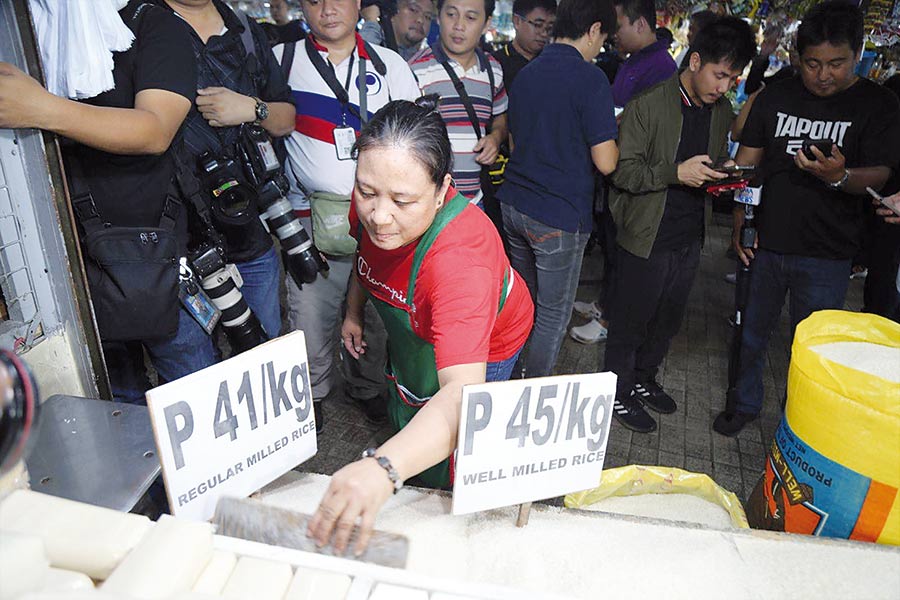The country’s chief economic planner has called for a review of the existing tariff levels on rice to help lower the cost of this staple for consumers while considering the impact of this intervention on local producers.
Secretary Arsenio Balisacan, director-general of the National Economic and Development Authority, made this proposal as Executive Order (EO) No. 39 which pegs the price of regular milled rice at P41 per kilogram (kg) and of well-milled rice at P45 per kg.t took effect yesterday.
“To partially counterbalance the rise in global prices and alleviate the impact on consumers and households, we may implement a temporary and calibrated reduction in tariffs,” Balisacan said in a statement.
The Department of Trade and Industry (DTI) a monitoring team led by Interior Secretary Benjamin Abalos, Senior Undersecretary Domingo Panganiban of the Department of Agriculture (DA), DTI assistant secretary Agaton Uvero and other officials checked on the compliance by retailers to the imposed price ceilings in two public markets, Agora in San Juan and Nepa Q-Mart in Quezon City.
The DTI did not say if the compliance was low or high but noted the strong market visibility established through the presence of the inter-agency price monitoring team encourages rice retailers to support the implementation of EO No. 39.
The DTI said the team was also able to explain the objectives of the EO — that the price cap is only a temporary measure and that the price of rice is likely to go down as harvest season approaches and rice imports come.
Uvero said the DTI and the DA have started collating the list of retailers entitled to the assistance to be given by the Department of Social Welfare and Development.
In the coming days, monitoring teams will continue visiting wet markets and supermarkets on a day-to-day basis to ensure compliance with the price ceilings of regular- and well-milled rice.
Based on monitoring by the DA on public markets in the National Capital Region yesterday, the price of local well-milled rice ranged from P45 to P53 per kg; and regular milled at P41 to P52 per kg.
The price of imported well milled rice was P45 and regular milled was P43, slightly higher than the cap.
Imported rice ranged from P53 to P65 for special variety and P52 to P56 for premium;
For local rice, special variety was at P54 to P62 per kg; premium at P49 to P60 per kg;
Weekly monitoring
Glenn Panganiban, director of the Bureau of Plant Industry (BPI), told the Laging Handa public briefing yesterday rice prices will be monitored weekly by the Agribusiness and Marketing Assistance Service and once stable will become the basis for the lifting of the price caps.
Panganiban said the BPI will continue monitoring storages or rice warehouses as previous reports showed there is enough supply.
He added this will also ensure there will be no re-branding or repacking of to avoid the price caps .
Beyond the ceiling
Beyond the price caps, the government has other measures that will help tame inflation moving forward.
Finance Secretary Diokno said in a statement the government will implement measures to mitigate the concerns of rice retailers and farmers and at the same time adopt a comprehensive approach to ensure that the rice supply remains sufficient at lower prices and greater competition is promoted in the rice industry.
Diokno said the government has been undertaking measures to mitigate non-food inflation by tackling energy and water demand management measures; supply management measures; managing cost of electricity; careful review of hike petitions; monitoring of the imposition of pass-through fees for delivery trucks; and timely and continued monitoring of non-food inflation indicators.
To help protect the vulnerable sectors, the government will focus on the completion of its targeted cash transfer (TCT) program, as well as its fuel subsidy program for qualified public utility vehicle (PUV) drivers and operators. Meanwhile, the government shall also expedite the roll-out of the fuel discount program for the agriculture and fisheries sector, wherein more than 312,000 farmers and fisherfolk shall benefit.
According to Diokno, the Inter-agency Committee on Inflation and Market Outlook remains on top of monitoring the developments in food and non-food inflation. It will also closely monitor the implementation of EO 39 to help ensure that the short-term measure will be effective.
Aid to farmers, consumers
Balisacan stressed the importance of providing comprehensive assistance to rice and vegetable farmers to help them increase their production in response to the adverse effects of continuous rains last month and the anticipated impact of El Niño on domestic rice and vegetable production in the first quarter of 2024.
Balisacan said the DA and the National Food Authority augment support to farmers in the drying and milling palay in the upcoming harvest season.
NEDA recommends hastening the implementation of programs to facilitate the swift recovery of production in typhoon-affected areas.
To aid consumers, particularly the poor, Balisacan said that the government needs to accelerate the Food Stamp Program (FSP) rollout. The FSP is one of the priority programs of the DSWD, which will provide P3,000 worth of food credits to target beneficiaries each month for six months.
Other government support to consumers includes the continued implementation of Kadiwa stores, targeted cash transfers, and the DTI Diskwento Caravan. Irma Isip, Jed Macapagal





